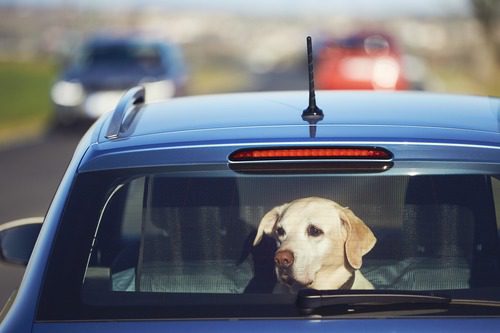Is Your Dog’s Belly Bloated? Here’s What You Need to Know
Is Your Dog’s Belly Bloated? Here’s What You Need to Know
As a pet guardian, you always worry about your furry friend’s health and well-being. One of the problems that dogs face is a bloated belly. A bloated belly in dogs is not just a cosmetic issue; it can be an indicator of major health problems. A bloated dog belly in dogs can be caused by several factors, and it’s crucial to identify the symptoms and take the required steps to help determine the root of the issue. In this article, we’ll go through the reasons behind a bloated belly in dogs, the symptoms to look out for, and what you can do to assist your furry friend.
What Causes Bloated Belly in Dogs?
A bloated belly in dogs can be caused by various factors, including overeating, swallowing air, gastric dilatation-volvulus (GDV), intestinal obstruction, parasites, etc.
Overeating
One of the primary reasons for a bloated belly in dogs is overindulging. If a dog has access to food all day, it can lead to a bloated belly. This is because the stomach swells up from the excess food.
Swallowing air
Dogs can also inhale air while eating or drinking, leading to a bloated belly. This is common in dogs that eat quickly or gulp down large amounts of water at once.
Gastric Dilatation-Volvulus (GDV)
GDV is a serious condition where the stomach twists on itself, leading to a bloated belly. This is a perilous condition that needs urgent veterinary attention.
Intestinal obstruction
If a dog ingests an object that it shouldn’t, it may result in blockage in the intestines, leading to bloating. This is especially common in puppies who like to chew on things they shouldn’t.
Parasites
Parasites such as roundworms, hookworms, and tapeworms can also cause a bloated belly in dogs. These parasites can live in the intestines and cause inflammation, leading to bloating.
Food intolerances or allergies
Some dogs can have food sensitivity or allergies that can cause bloating. If a dog is allergic to a certain food, their body may react by producing excess gas.
Fluid accumulation (Edema)
Fluid buildup in a dog’s abdomen results in a swollen belly. Heart failure, Protein Losing Intestinal Disease, Liver disease or certain tumors can be among the potential causes.
Obesity
Dogs that are overweight or paunchy are more likely to develop a bloated stomach. This is because excess fat can put pressure on the organs in the abdomen, leading to flatulence.
Degrees of bloating in Dog
When it comes to a bloated belly in dogs, there are varying degrees of severity. Here are some of the types of bloated bellies in dogs:
Mild bloating
Mild bloating is often caused by overeating, swallowing air, or eating too quickly. It might be uncomfortable for the dog, but it is usually not a major concern.
Moderate bloating
Moderate bloating is characterized by a visibly distended belly and discomfort for the dog. It may be caused by more serious conditions such as intestinal obstruction, parasites, or food allergies.
Severe bloating
Severe bloating is a medical emergency and requires immediate veterinary attention. This is often indicative of GDV.
Chronic bloating
Chronic bloating is a persistent, long-term condition that can be caused by a variety of factors, such as obesity, food intolerances, or certain medical conditions. This type of bloating may require ongoing treatment or management.
How can you tell if your dog’s belly is bloated?
The symptoms of a bloated belly in dogs may vary depending on the underlying cause. However, some common signs to look out for include:
- Swollen or distended belly
- Vomiting
- Difficulty breathing
- Lethargy
- Loss of appetite
- Abdominal pain
- Restlessness
- Rapid heartbeat
Early detection and treatment can help prevent the condition from becoming severe and even life-threatening.
What are the Risk Factors of Bloat?
- Large breed dogs, such as Great Danes, St. Bernards, and Doberman Pinschers, are more susceptible to bloat.
- Dogs that have a family history of bloat.
- Dogs that have had a previous episode of bloat.

What Can You Do to Help Your Dog Feel Better?
The treatment for a bloated belly in dogs depends on the underlying cause. If you suspect that your dog’s belly is bloated, the first thing you should do is take them to the vet. Your vet will be able to determine the cause of the bloating and provide the necessary treatment.
There are some things you can do to help your dog feel better.
Smaller Meals
Feed your dog smaller meals multiple times throughout the day rather than serving big meals at once. This will help prevent overeating and reduce the risk of a bloated belly.
Well Balanced Diet
Check that your dog is eating a well-balanced diet and isn’t ingesting any harmful things. Avoid giving your dog table scraps, especially foods that are high in fat.
Hydrate
Teach or encourage your dog to drink more water to aid in getting rid of any toxins from their body. Dehydration can exacerbate bloating, so make sure your dog always has access to clean drinking water.
Avoid Certain Foods
Avoid giving your dog foods that are known to cause bloating: Some foods are more likely to cause bloating than others, including beans, broccoli, cabbage, and onions. Avoid giving these foods to your dog.
Slow Down
Slow down eating: Some dogs eat too quickly, which can also contribute to bloating. To slow them down, you can use a special bowl designed to make eating more challenging or you can spread their food out on a flat surface.
Exercise
Exercise your dog regularly to help them maintain a healthy weight. However, please be aware that GDV can also be caused by too much exercise, in which case exercise would not be recommended. For this reason, you should always consult with your veterinarian before increasing or implementing a new exercise routine.
Obstructions & Parasites
If your dog has an intestinal obstruction, they may require surgery to remove the blockage. This will help relieve the bloating and other symptoms.
If your dog has parasites, they will need to be treated with medication. Your vet can prescribe appropriate medication to help get rid of the parasites and reduce the bloating.
What vets will do for a severe emergency case of bloating?
An emergency case requires immediate veterinary attention. Here are the steps that a vet may take if your dog is experiencing an emergency bloating episode:
Physical Examination
The veterinarian will physically examine your dog to evaluate the severity of the bloating and check for any other symptoms or underlying health issues.
Stabilization
If your dog is in shock or unsteady, the vet may need to alleviate the issue with fluids, oxygen, or other supportive measures.
Diagnostic Tests
The vet may perform diagnostic tests such as X-rays, ultrasounds, blood work, or other imaging studies.
Decompression
Animal doctors may need to decompress the stomach by inserting a tube through the mouth or nose and into the stomach to release trapped gas.
Surgery
In severe cases of GDV or intestinal obstruction, surgery may be necessary to untwist the stomach or remove the obstructing object.
Medications
The vet may prescribe medications such as antibiotics, pain relievers, or anti-inflammatory drugs to help manage your dog’s condition.
Follow-Up Care
After the preliminary emergency has been managed, your dog may require ongoing follow-up care, such as dietary changes, medication management, or further diagnostic testing.
Conclusion
Bloat is a serious condition that can be life-threatening for dogs. If you suspect your dog has bloat, it’s important to seek veterinary care immediately. By understanding the risk factors for bloating and taking steps to reduce your dog’s risk, you can help keep your furry friend healthy and happy.
If you are located near Cooper City, FL and dealing with a bloated dog belly, Embassy Lakes Animal Hospital is here to help. Our expert veterinarians can be reached at (954) 432-5811, or you can Request an Appointment Online.
Share This Article
Related Articles
About Embassy Lakes Animal Hospital
Located in Cooper City, FL, we strive to do more than simply be a full-service veterinarian for your pet. Our decades of experience has served generations of families and their beloved pets and we look forward to serving you as well!



